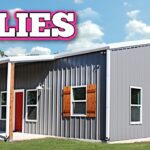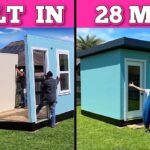Discover the truth behind the most common misconceptions about manufactured homes. Uncover the facts that challenge the myths and help you make informed decisions.
Understanding Manufactured Homes
Manufactured homes, often referred to as mobile homes, have gained popularity due to their affordability and flexibility. These homes are built in factories and transported to their final locations, making them a viable option for many families.
Unlike traditional homes, manufactured homes are constructed according to federal standards set by HUD, ensuring safety and quality. This distinction is crucial for potential buyers who may be misled by common myths.
One of the primary advantages of manufactured homes is their cost-effectiveness. They typically require less investment compared to site-built homes, allowing families to achieve homeownership without breaking the bank.
Moreover, manufactured homes can be customized to suit individual preferences, offering a range of designs and layouts that appeal to diverse lifestyles.
Myth 1: Manufactured Homes Are Low Quality

Debunking the Quality Myth
A prevalent misconception is that manufactured homes are of inferior quality compared to traditional homes. However, modern manufactured homes are built with high-quality materials and adhere to strict construction standards.
Many manufacturers offer warranties that cover structural integrity, appliances, and other components, providing peace of mind to homeowners.
Additionally, advancements in building technology have significantly improved the durability and energy efficiency of manufactured homes, making them a smart choice for many buyers.
Homebuyers should consider visiting a factory or model home to witness the construction process and quality firsthand.
Comparing Construction Standards
Manufactured homes are constructed under the HUD Code, which is more stringent than many local building codes. This ensures that these homes are built to withstand various environmental conditions.
In contrast, site-built homes may vary in quality based on the builder and local regulations, leading to inconsistencies in construction standards.
Understanding these differences can help potential buyers appreciate the quality and safety of manufactured homes.
Overall, the perception of low quality is outdated and does not reflect the realities of modern manufactured home construction.
Myth 2: Manufactured Homes Depreciate Quickly
Understanding Depreciation
Another common myth is that manufactured homes depreciate faster than traditional homes. While it’s true that all homes can depreciate, the rate varies based on several factors.
Location plays a significant role in the value retention of manufactured homes. Homes situated in desirable areas or well-maintained communities often appreciate over time.
Furthermore, improvements and upgrades made to the home can enhance its value, countering the myth of inevitable depreciation.
Buyers should research local market trends to understand how manufactured homes perform in their desired area.
Market Trends and Value
In recent years, the demand for affordable housing has increased, leading to a surge in the value of manufactured homes in certain markets. This trend indicates that manufactured homes can be a sound investment.
Additionally, as more people seek affordable housing options, the perception of manufactured homes is shifting, contributing to their appreciation in value.
Buyers should consider the long-term potential of manufactured homes rather than relying on outdated beliefs about depreciation.
Engaging with real estate professionals who understand the manufactured home market can provide valuable insights into value retention.
Myth 3: Financing Manufactured Homes Is Difficult
Exploring Financing Options
Many potential buyers believe that securing financing for a manufactured home is challenging. However, various financing options are available, making it easier than ever to purchase these homes.
Manufactured home loans can be obtained through traditional lenders, credit unions, and specialized mortgage companies. Understanding the different types of loans available can help buyers navigate the financing process.
Additionally, government-backed loans, such as FHA and VA loans, can be used to finance manufactured homes, providing further accessibility for buyers.
It’s essential for buyers to compare rates and terms from multiple lenders to find the best financing solution for their needs.
Improving Loan Accessibility
As the market for manufactured homes grows, lenders are becoming more familiar with financing options tailored specifically for these properties. This increased familiarity can lead to more favorable loan terms for buyers.
Furthermore, many lenders offer competitive interest rates, making manufactured homes an attractive option for first-time homebuyers.
Working with a knowledgeable mortgage broker can also simplify the financing process and help buyers secure the best possible deal.
Overall, the belief that financing manufactured homes is difficult is largely a misconception, as various options are available to suit different financial situations.
Myth 4: Manufactured Homes Are Not Energy Efficient
Energy Efficiency Standards
Contrary to popular belief, many manufactured homes are designed with energy efficiency in mind. Modern homes often come equipped with energy-efficient appliances, insulation, and windows that help reduce energy consumption.
Manufacturers are increasingly focusing on sustainability, implementing practices that enhance the energy efficiency of their homes. This commitment not only benefits homeowners but also contributes to environmental conservation.
Many manufactured homes are built to exceed energy efficiency standards, which can lead to lower utility bills and a reduced carbon footprint.
Homebuyers should inquire about the energy ratings of manufactured homes to understand their efficiency levels better.
Long-Term Savings
Investing in an energy-efficient manufactured home can result in significant long-term savings for homeowners. Lower energy costs can offset the initial purchase price, making these homes more affordable over time.
Additionally, energy-efficient homes are often more comfortable, providing better temperature control and air quality.
As energy costs continue to rise, the advantages of owning an energy-efficient manufactured home become increasingly appealing.
Buyers should consider the potential savings when evaluating the overall cost of homeownership.
- Condition of the roof and exterior siding
- Functionality of windows and doors
- Quality of insulation and energy efficiency ratings
- State of plumbing and electrical systems
- Presence of any signs of water damage or mold
Frequently Asked Questions (FAQ)
What are common myths about manufactured homes?
Common myths include the belief that manufactured homes are low quality, depreciate like cars, and are not customizable. In reality, many manufactured homes are built to high standards, can appreciate in value, and offer various customization options to suit individual preferences.
Are manufactured homes safe during extreme weather?
Manufactured homes are built to meet specific safety standards, including wind resistance. However, their safety during extreme weather depends on proper installation and location. Many modern manufactured homes are designed to withstand severe weather conditions, but homeowners should ensure they are anchored correctly.
Do manufactured homes have a shorter lifespan than traditional homes?
Manufactured homes can last just as long as traditional homes if properly maintained. With advancements in building materials and techniques, many manufactured homes are designed for durability and longevity, often exceeding 30 years or more with regular upkeep.
Can you finance a manufactured home?
Yes, financing options for manufactured homes are available, including loans through FHA, VA, and conventional lenders. However, the type of financing may depend on whether the home is classified as personal property or real estate, so it’s essential to understand the distinctions when applying for a loan.
Are manufactured homes energy-efficient?
Many manufactured homes are designed with energy efficiency in mind, featuring modern insulation, energy-efficient windows, and appliances. Homebuyers can also choose Energy Star-rated models that further reduce energy consumption, leading to lower utility bills and a smaller environmental footprint.





















